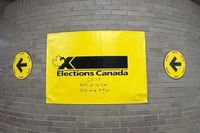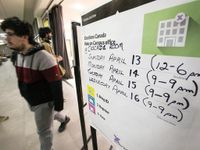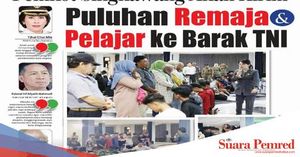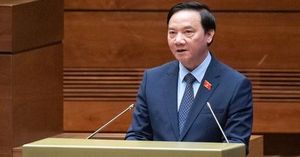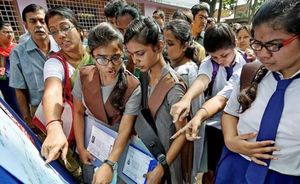As Canada gears up for its federal election on April 28, 2025, young voters are making their presence felt, particularly on university campuses. Judy Zhu, an 18-year-old computer science student at the University of Alberta, cast her vote for the first time on Monday, April 14, at a polling station set up in the Students’ Union Building. This initiative, part of Elections Canada’s Vote on Campus program, aims to make voting more accessible for students across the country.
With polling stations open until Wednesday, April 16, 2025, the basement of the U of A’s Students’ Union Building was bustling with activity. A dozen polling stations were staffed by attendants ready to assist students in locating their ridings. Zhu expressed her enthusiasm for participating in the electoral process, stating, “It was really important to stay up to date with current events and do the research not only nationally, but with the specific candidates in my riding, too.”
This year’s initiative comes in response to the disappointing voter turnout among young Canadians. In the 2021 federal election, only 46.7 percent of eligible voters aged 18-24 cast their ballots, making them the least engaged demographic. Elections Canada has expanded its efforts, bringing polling to approximately 120 universities and colleges where there are over 4,000 eligible voters.
For Zhu, voting on campus was significantly more convenient than traveling to her designated polling station on April 28. She highlighted the ongoing trade and tariff issues with the United States as a pressing concern, noting, “I think seeing how Canada responds and mitigates the cost of that conflict is important.”
Another first-time voter, Kat Riedlberger, 19, also voted at the U of A and echoed Zhu’s sentiments regarding the convenience of on-campus voting. “I can come after my exams are finished, and it makes it a lot easier, for sure,” she said. Riedlberger’s concerns mirror those of her peers, with tariffs and educational costs topping her list of issues. “The big issue is definitely the tariffs and our relationship with the United States,” she noted. “Also, a big issue for me is education, especially because I’m a university student and I worry about fees increasing.”
Teyton Soll, a 20-year-old engineering student, expressed gratitude for the polling station’s location, stating, “Having the polling station here is convenient because I can just walk in here and do it instead of having to wait till I get back home.” Faith Merryweather, 21, added, “It’s about making my voice heard, as a part of the younger generation. I’m excited to have the opportunity to vote right now.”
Interestingly, recent polling indicates a shift in young voters’ political preferences. A Nanos poll revealed that 41 percent of voters aged 18-24 intend to support the Conservative Party, while 37 percent back Liberal Leader Mark Carney. This trend challenges the long-held belief that youth tend to lean left in their voting habits.
Jaian Dhebar, outreach director of the Canadian Conservative Youth Association, emphasized the importance of mobilizing young voters. “Don’t vote alone, vote with a friend,” he urged, recognizing that the challenge lies in translating interest into actual votes. Dhebar noted that young people are increasingly concerned about housing affordability after graduation, which resonates with Pierre Poilievre’s campaign message.
“What I see in Pierre Poilievre’s rallies that is different, we didn’t even see this from Donald Trump or Kamala Harris, is that he doesn’t stand behind a podium,” Dhebar explained. “He stands in a square in the middle of the room, and he’ll turn and face all four sides of the room.” This approach was evident at Poilievre’s recent rally in Nisku, where he engaged directly with attendees.
On the other side of the political spectrum, Hayden Henderson, outreach director for Canada’s Young New Democrats, expressed hope that young voters will gravitate towards left-leaning policies. “Young people have a lot at stake in this election,” he stated. “They’re anxious about the future and they’re looking for leaders who will fight for them. Young people want to be able to afford rent in the cities they love and eventually save up to buy a home.”
Henderson noted that the NDP is actively targeting the youth vote through digital ads and initiatives that engage young people via trusted creators. “We’ve got stellar young candidates, dedicated volunteers, and strong youth support across the country,” he added.
In addition to the excitement on campuses, Elections Canada is also ramping up its efforts to staff polling stations nationwide. With two weeks remaining until election day, the agency is seeking to hire over 250,000 poll workers across the country, including approximately 700 for each of Canada’s 343 ridings. In the London region alone, Elections Canada is looking for around 200 to 250 staff members per riding.
Spokesperson Nathalie de Montigny shared that the hiring process is progressing well, stating, “Elections Canada on election day will be the largest employer in Canada.” Eligible applicants must be Canadian citizens aged 16 or older, allowing even those who cannot vote yet to gain firsthand experience in the electoral process.
On election day, workers will be expected to be present at polling stations for 12 hours, plus additional time for counting ballots. Wages for poll workers range from $20 to $26.50 per hour, depending on the position. Those working at advanced voting stations on Good Friday or Easter Monday will receive a statutory holiday top-up.
As part of the voting process, Canadians can expect to receive their voting information cards in the mail this week, detailing their assigned polling stations and required identification. Various voting methods are available, including advanced voting from April 18 to April 21, early voting at Elections Canada offices until April 22, and mail-in ballots with a deadline of April 22.
With the election campaign heating up, candidates are preparing for debates scheduled for later this week, including a French-language debate on April 16 and an English debate on April 17. As the election approaches, young Canadians are stepping up to make their voices heard, shaping the future of their country.
